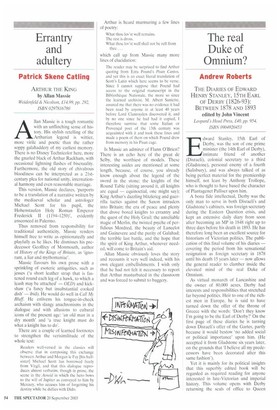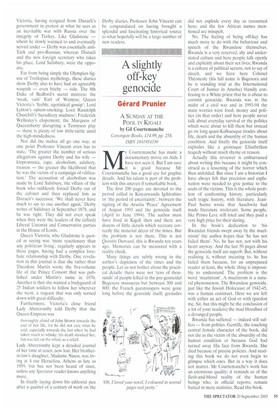The real Duke of Omnium?
Andrew Roberts
THE DIARIES OF EDWARD HENRY STANLEY, 15TH EARL OF DERBY (1826-93): BETWEEN 1878 AND 1893 edited by John Vincent Leopard's Head Press, £40, pp. 954; ISBN 0904920453 Edward Stanley, 15th Earl of Derby, was the son of one prime minister (the 14th Earl of Derby), intimate friend of another (Disraeli), colonial secretary to a third (Gladstone), personal enemy of a fourth (Salisbury), and was always talked of as being perfect material for the premiership himself, not least by Anthony Trollope, who is thought to have based the character of Plantagenet Palliser upon him.
A bona fide intellectual, Derby was the only man to serve in both Disraeli's and Gladstone's cabinets, was foreign secretary during the Eastern Question crisis, and kept an extensive daily diary from soon after becoming an MP in 1848 right up to three days before his death in 1893. He has therefore long been an excellent source for historians of Victorian politics. The publication of this final volume of his diaries — covering the period from his sensational resignation as foreign secretary in 1878 until his death 15 years later — now allows the general reader to clamber inside the elevated mind of the real Duke of Omnium.
As virtual monarch of Lancashire and the owner of 80,000 acres, Derby had interests and responsibilities that stretched far beyond politics. Heir to one of the richest men in Europe, he is said to have turned down the offer of the throne of Greece with the words: 'Don't they know I'm going to be the Earl of Derby?' On the first page of these diaries he is turning down Disraeli's offer of the Garter, partly because it would bestow 'no added social or political importance' upon him. (He accepted it from Gladstone six years later, on the grounds that 'I believe all my predecessors have been decorated after this same fashion').
Yet it is mainly for its political insights that this superbly edited book will be regarded as required reading for anyone interested in late-Victorian and imperial history. This volume opens with Derby returning the seals of office to Queen
Victoria, having resigned from Disraeli's government in protest at what he sees as an inevitable war with Russia over the integrity of Turkey, Like Gladstone — whom he slowly warmed to and eventually served under — Derby was essentially antiTurk and pro-Russian, whereas Disraeli and the new foreign secretary who takes his place, Lord Salisbury, were the opposite.
Far from being simply the Olympian figure of Trollopian mythology, these diaries show Derby also to have had an agreeably waspish — even bitchy — side. The 8th Duke of Bedford's secret mistress; the 'weak, vain' Earl of Wemyss; Queen Victoria's 'feeble, egotistical gossip'; Lord Lytton's opium-smoking; Lord Randolph Churchill's 'hereditary madness'; Frederick Wellesley's elopement; the Marquess of Queensberry disrupting a Tennyson play — there is plenty of low tittle-tattle amid the high-mindedness. Nor did the malice all go one way; at one point Professor Vincent even has to state, 'The greater the number of serious allegations against Derby and his wife — kleptomania, rape, alcoholism, adultery, treason — the greater the likelihood that he was the victim of a campaign of vilification.' The accusation of alcoholism was made by Lord Salisbury, the villain of the book who ruthlessly forced Derby out of the cabinet and then replaced him as Disraeli's successor. 'We shall never have much to say to one another again,' Derby writes of Salisbury in September 1878, and he was right. They did not even speak when they were the leaders of the (allied) Liberal Unionist and Conservative parties in the House of Lords.
Queen Victoria, who Gladstone is quoted as saying was 'more reactionary than any politician living', regularly appears in these pages, having had a complex lovehate relationship with Derby. One revelation in this journal is that she rather than Theodore Martin wrote the five-volume life of the Prince Consort that was published under Martin's name in 1876. Another is that she wanted a bodyguard of 25 Indian soldiers to follow her wherever she went, a request that was only turned down with great difficulty. Furthermore, Victoria's close friend Lady Abercromby told Derby that the Queen-Empress was
thoroughly afraid of John Brown towards the end of her life, for he did not care what he said, especially towards the last when he had taken much to whisky: his death shocked her, hut was felt on the whole as a relief.
Lady Abercromby kept a detailed journal of her time at court, now lost. Her brotherin-law's daughter, Madame Nasos, was living at 4 rue Heractiou, Athens as late as 1959, hut has not been heard of since, unless any Spectator reader knows anything more.
In finally laying down his editorial pen after a quarter of a century of work on the
Derby diaries, Professor John Vincent can be congratulated on having brought a splendid and fascinating historical source to what hopefully will be a large number of new readers.



















































































 Previous page
Previous page